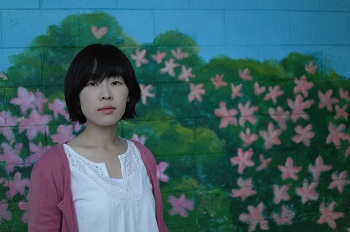
Choi Jin-young is a writer who published “Dear Watch Night,” novel that illustrates the reality of sexual harassment victims. Her book focuses on how the protagonist overcome hardships.
Choi majored in Korean Language & Literature at Duksung Women’s University. As she was interested in writing journals and letters since she was little, she started off her literary career in Silcheon Munhak which is a collection of works from writers on Korean literature. She was awarded the Rookie of the Year of Silcheon Munhak short story section in 2006, and she also won the Sin Dong-yup Prize for Literature.
With Choi’s sense of delicate sentimentality and sophisticated way of delivering the story, Changbi Publisher planned out the “Novel Q” series and they have selected her work “Dear Watch Night” as the frontrunner. According to Changbi Publisher, the “Novel Q” series strives to provide contemporary readers with stories that incorporate the characteristics of quick, quip, queer, and quarrel.
“Dear Watch Night” is narrated in the form of a diary where the victim Lee Jae-ya describes the consciousness and reality of victims who experienced sexual violence. The narration of the novel alternates between direct speech from the protagonist and a third person point of view.
When she decided to write a story about a victim of sexual abuse, Choi came up with the name Lee Jae-ya. Lee Jae-ya connotes the meaning of ‘at last’ and ‘New Year’s Eve’ in Korean. The ringing bell on the last day of the year is called the Watch-Night bell, which is also called Jaeya’s bell, so she believed that it serves as an important meaning where night changes to dawn. The name implicates the gradual brightness of the day. Although the process may be slow, she wanted the protagonist to steadily head towards a hopeful future which is illustrated towards the end of the story.
“I wanted to provide Jae-ya with the right to speak, so I chose the novel to be delivered from a first-person point of view,” Choi said. “It is expressed through her voice directly, not by an observer. However, as I was writing, I felt that she might be reluctant to speak out parts such as her incident of being sexually harassed. Hence, this scene was described in a third-person point of view.”
She shared her thoughts on how the attitude and the focus of media which report the incident on the spot have to change to overcome challenges regarding women’s rights in modern society.
“Although people became aware of their behavior after the viral #MeToo movement, there are still obstacles since it is mostly the victims who are the ones who must speak out,” Choi said. “I am confused about how the majority investigate the assailant’s circumstances in priority. Instead of delving into the assailant’s motivation, we have to empathize with sufferers first since we are also people who may be prone to becoming the target victim.”
Choi added that it was not difficult to write a story about victims of sexual harassment, because there are numerous sufferers in reality. Therefore, she wanted to focus on the victim as the main character rather than objectifying her.
“Instead of concentrating on the depression of the victim I aimed to describe the plotline by Jae-ya confronting the incident and acknowledging her existence as a human being,” Choi remarked. “I consider that it is essential to take the perspective of her emotions into consideration.”
Choi also mentioned that she carefully took into consideration of Jae-ya’s point of view to express her feelings, and she suggested that imagining and wholly emphasizing with a person’s life as the duty of a writer.
By highlighting the ability to empathize with the characters to address the key message of the story, she plans to write a novel about issues that need to be thoroughly questioned in society, which are considered as a trivial matter in life.
“Because all our lives are dynamic and unique, readers show more in-depth understanding and make various interpretations of the story,” Choi commented. “Based on their ability, I hope the audience will comprehensively reflect the questions that I discuss in the novel.”

